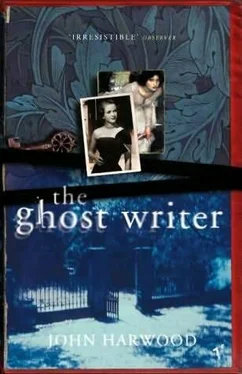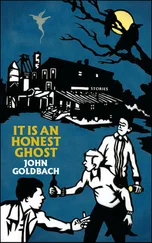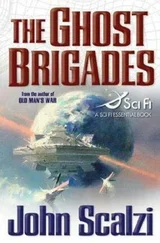We had photographs of my father's parents, of his sister and her husband and children, but of my mother nothing before her wedding day, and very little after. The wedding photograph, taken on the steps of Mawson Registry Office in May 1963, is in black and white, just the two of them, no confetti. My mother is wearing a skirt and jacket and the sort of shoes that used to be called sensible. Thirty-four years (as I would learn from my own birth certificate)-thirty-four years of being Phyllis May Hatherley have just ended without trace, at the side of Graham John Freeman. My father's left arm is crooked for her to hold, which she does awkwardly. His clenched fist presses against his ribs. The top of her head is level with the handkerchief projecting from his breast pocket. His dark suit doesn't fit properly; the sleeves are too short, the shoulders droop. You could easily mistake him for the father of the bride, though he's only eleven years older. The lower half of his face has already taken on the shrunken, slightly simian look that makes you think someone isn't wearing their false teeth. And despite my mother's insistence that the sun was shining, they both look cold and undernourished, as if it's really a winter's day in England, a decade or more earlier, with rationing still in force.
I don't think my father ever knew any more about her life before they met than I did. He seemed to have been born without the faintest vestige of curiosity. His own father had come from an engineering family in Southampton, emigrated to Sydney in the 1920s, married, survived the Depression and war service as a mechanic in the RAAF, and set up his own machine shop. Dedicated to perpetuating the finest standards of British craftsmanship, with a portrait of the reigning monarch on the office wall. So far as my father was concerned, his entire family history could be expressed in micrometer readings, expansion coefficients, and the ability to work to tolerances set not merely in 'thou', but within a few ten-thousandths of an inch. As a draftsman, he must have been fluent in the new metric system, but we spoke only imperial at home. Whatever they might believe at Mawson Junior High, I knew that reality was measured in pounds and ounces, feet and inches, chains and furlongs and acres and miles and strange biblical quantities like cubits.
Outside of his workshop, my father's only apparent aim was to get through life as quietly and inconspicuously as possible. As far back as I could recall, my parents had slept apart, though they must, presumably, have shared a bed at least once. His room was as bare as a monk's cell. Board floor, single bed, bedside locker, wardrobe, chest of drawers. And one upright chair. No secrets there. On top of the chest of drawers he kept a framed photograph of my mother, one of the few we had, standing on the front porch in her twinset and sensible shoes, doing her best to smile. As if she were on the other side of the world instead of across the hall. They called each other dear, and never quarrelled within my hearing. Every morning he would collect the lunch she had packed for him and set off for the Land Surveys Department. He dug the vegetable garden, serviced the car, and did the household repairs. The rest of his time he spent with his trains.
They were nominally mine at first: 00 gauge electric, on a six by four baseboard in a corner of the garage. An oval track with an inside loop, a siding, two stations, and a tunnel through a papier mâché mountain. I was bored within hours; he doubled the outside track; after a few more hours I lost interest again. We all went on speaking of 'Gerard's trains' for years as the baseboard expanded and the tracks tripled and quadrupled below the signals and gantries and water towers, and the engines and rolling stock multiplied until our car was eased out into the carport, never to return despite the threat of rust. He bought an old kerosene heater for the winters, then a second-hand air conditioner for the ferocious summer heat. The baseboard grew until there was only a narrow walkway down each side to his stationmaster's quarters at the far end, where he had his workbench and his electric jug, an old brown leather swivel chair, and row after row of switches and levers and dials, all labelled according to a code that he carried around in his head. Everything on the board was electrified: not just the trains, but lights, points, signals, level crossings, even miniature bells. He bought his components-boxes of relays and solenoids and rheostats and endless coils of coloured wire-at army surplus sales and government auctions, swap meets with other train men. When the air conditioner wasn't running you could hear the hum of the transformers.
Every line had its own timetable, and all of the stations had English village names like East Woking or Little Barnstaple, but the network wasn't a map or a model; it was a self-contained, perfectly ordered world, every tiny detail meticulously crafted to scale, except that it contained no human figures. Some train men have crowds of miniature people waiting on platforms, fields full of minutely hand-painted porcelain cows: my father's universe was populated only by trains. If it hadn't been for your mother's nerves', I think he might have moved into the shed altogether; as it was, he brought the last train into the depot at 10.27 each night and retired dutifully to his bedroom. He and I were always going to have a bit of a talk about things' but we still hadn't quite got around to it on the night, just before my eighteenth birthday, when he didn't come in at 10.30, or eleven, and she found him dead in his stationmaster's chair, with a single train running at full speed, round and round the outermost track.
IF I HAD SEEN PICTURES OF STAPLEFIELD, THEY MIGHT HAVE cramped my imagination of it, suffused with depths and subtleties of colour unknown in Mawson. Memories of Staplefield-my memories, as they truly seemed, for my mother's stories had left me with such an acute visual sense of the place that I could walk around it in my head, fix my attention anywhere I pleased, the forge in the village street, or Viola, upright, elegant and silver-haired, seated at her walnut writing-desk, the two attic bedrooms with their gabled windows and dark wooden floorboards and Persian rugs, the view southwards over the fields from the pavilion on the hillside, and see every detail plain-these memories became my principal refuge as the miseries of Mawson Junior High crowded in. Until I met (for want of a better word) my invisible friend, Alice Jessell.
The letter arrived on a hot, airless, overcast morning towards the end of the summer holidays. I was thirteen and a half. My last days of freedom were slipping by. For weeks it had been too hot to do anything except lie on my bed reading or just listening to the rattle and creak of the fan as it swung to and fro, alternately wishing the time away and willing it to slow down. Nothing to look forward to but another year trailing after the legion of the lost: the swots, the cowards, the hopeless at sport. I heard the tinny put-putting of the postman's motorbike through my window and slouched out to the letter-box, just for something to do.
Apart from the usual bills and circulars, my parents received very little mail, and nothing at all from overseas except the occasional invitation to join a book or record club. Until that day, I don't think I'd ever seen a letter addressed to me. This one had my full name on it: Master Gerard Hugh Freeman. I slid the letter into the pocket of my shorts just before my mother followed me out the front door, and handed her whatever else the postman had brought.
Penfriends International, it said in typewriting at the top. PO Box 294, Mount Pleasant, London WC1. By Airmail. Inside was a letter, also typewritten beginning Dear Gerard, asking me if I would like a penfriend, and if so, whether a girl or a boy. All I had to do was write to the Secretary, Miss Juliet Summers, telling her something about myself to help her find me my ideal penfriend, and return my answer in the enclosed airmail envelope.
Читать дальше












